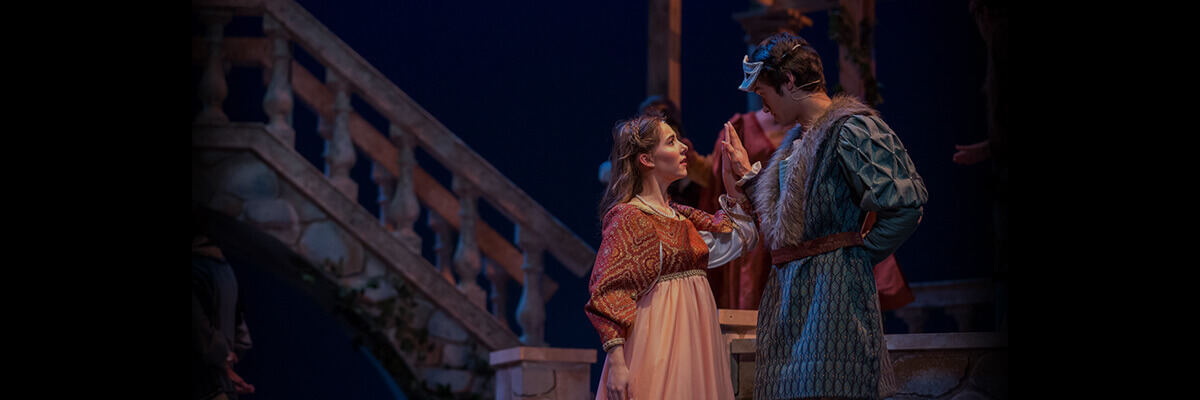
Boldly Reimagining Our Undergraduate Curriculum
Boldly Reimagining Shenandoah Conservatory’s Undergraduate Curriculum
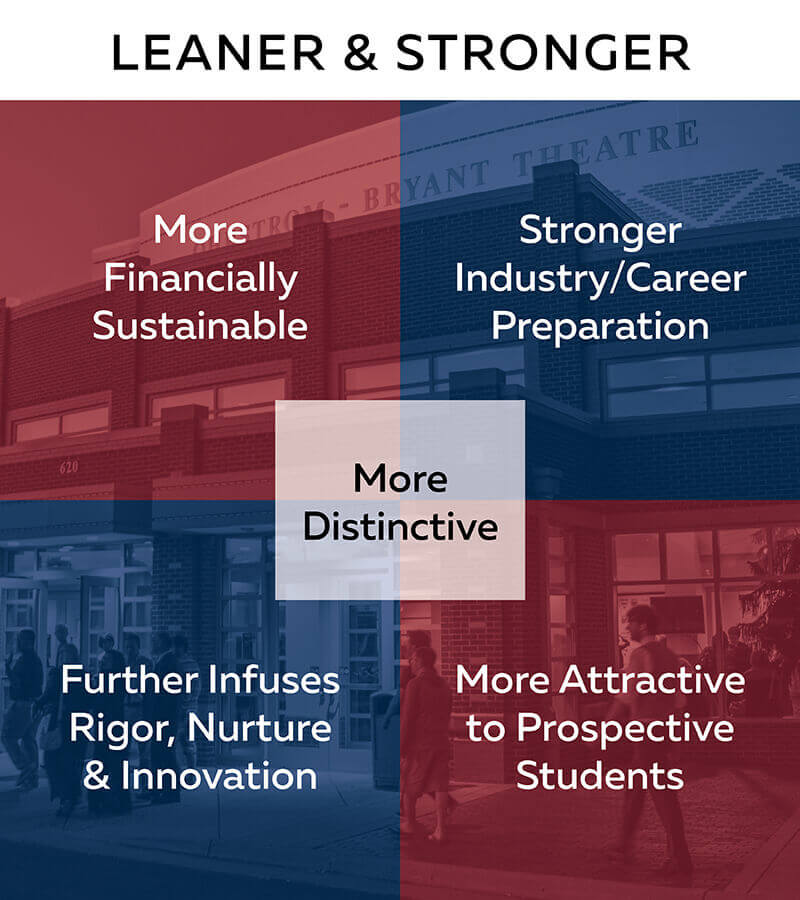
The Dean’s Twofold Commitment
- Ensure we avoid common PITFALLS:
- Process is quick but investigation remains shallow
- Ideas and proposals don’t build on shared faculty insight and ownership
- Ultimate changes are heralded as “innovative” or “radical” even while they are superficial, representing only tweaks to the edges of curriculum
- Changes don’t truly strengthen financial integrity and the school’s core identity
- Ensure our accelerated process not only has depth and integrity, but is also DOABLE
- Employ a strategic two-semester process that engages all faculty and provides rich opportunity for building of shared knowledge, while also strategically engaging leadership of smaller and representative faculty group
TASKFORCES
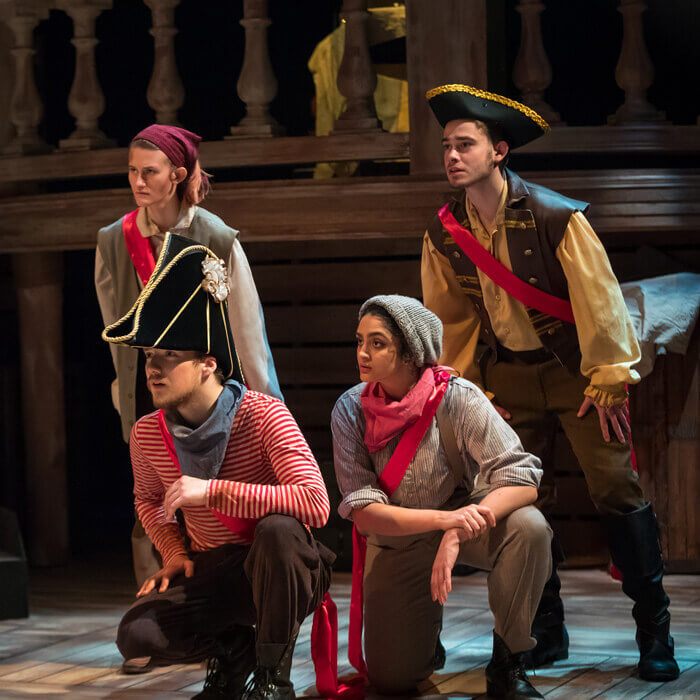
BEING WELL TOGETHER TASKFORCE
Comprising ten Shenandoah University faculty and staff and two Shenandoah Conservatory students, the Being Well Together Taskforce exists to strengthen a conservatory culture of holistic wellness through proactive student, faculty and staff development. The taskforce will build on work done to date by the Futures Group, and identify and recommend a select series of co-curricular conservatory events or initiatives for the 2020/21 year that will complement and supplement existing university resources.
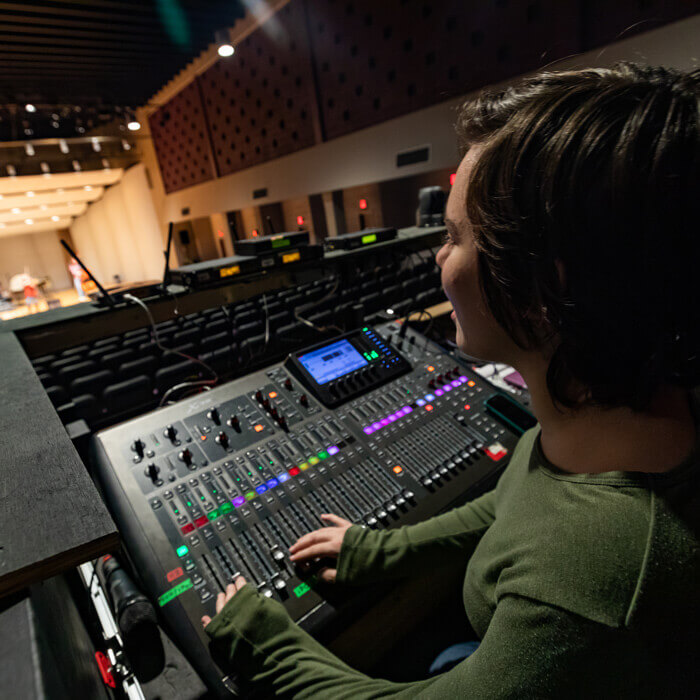
ShenCoSKILLS TASKFORCE
Comprising twelve Shenandoah University faculty and staff and two Shenandoah Conservatory students, the ShenCoSKILLS Taskforce exists to develop ways to supplement conservatory coursework in order to help first- and second-year undergraduate conservatory students better integrate into the conservatory, as well as to further knowledge and skills in key areas impacting their overall well-being and academic and professional success.
TIMELINE & PROCESS
FALL 2019 – CURRICULUM SUBMISSION
SUBMISSIONS TIMELINE: FALL 2019 SCHEDULE FOR CCC MEETINGS
SEPTEMBER 27 (DUE SEPTEMBER 20)
- Music Theory New Core (14 credits): KS
- Submission of New Course Proposals (titles, descriptions, rationale)
- Further strengthen student success by addressing:
- Relevance to 21st Century Career Preparation
- DFW rates
- Completion rates
- Music Literature: LM
- Submission of Revised Course Proposals
- Adjust equated hours (no increase in credit total – 3,3,3)
- Submission of Revised Course Proposals
- Ensembles/Productions: CC (with rep from Music TR, Theatre KT, Dance EH)
- Submission of Editorial Change Form
- Credits move from 1 to 2
- CONS 101 & CONS 201: TBD (Identify team during Welcome Week)
- Submission of New Course Proposals
- Submission of Inactivation Form for Performance Forum
- Music Minors: JM, SFB
- Submission of Revised Program Form
- Building on changes from Music Theory, Music Literature, and Music Ensembles
OCTOBER 4 (DUE SEPTEMBER 27)
- Music Education: SS
- Jazz Studies: RL
- Composition: JN
- MPRT: GO
- BA in R & AA: GS
- Songwriting Certificate: TBD
☐ Submission of Leaner & Stronger Affirmation Form
☐ Submission of Revised Program Form Submission
☐ Submission of Revised/New Course Proposals as needed
OCTOBER 25 (DUE OCTOBER 18)
- Theatre Design & Production: JA
- Acting: SH
- Musical Theatre: KC
- Dance: MF
- Dance & Theatre Minors: MP & CC
☐ Submission of Leaner & Stronger Affirmation Form
☐ Submission of Revised Program Form Submission
☐ Submission of Revised/New Course Proposals as needed
NOVEMBER 1 (DUE OCTOBER 25)
- Church Music: TM
- [B.A. in Collaborative Arts:
DELAYED TO ENSURE IDENTIFICATION OF ALL POSSIBLE COURSES IN NEW CURRICULA]
☐ Submission of Leaner & Stronger Affirmation Form
☐ Submission of Revised Program Form Submission
☐ Submission of Revised/New Course Proposals as needed
NOVEMBER 8 (DUE NOVEMBER 1)
- Music Performance: TBD
- Music Therapy: AM
- Musical Theatre Accompanying: KK & PB
☐ Submission of Leaner & Stronger Affirmation Form
☐ Submission of Revised Program Form Submission
☐ Submission of Revised/New Course Proposals as needed
DECEMBER 6
- Semester Clean-Up
FALL 2018 – Investigation
REVEALING CORE VALUES
- Core Values Exercise Findings from Faculty (Welcome Week Faculty Meeting)
- Core Values Exercise Findings from Student Council (September)
AFFIRMING BUSINESS MODEL REQUIREMENTS
- Business Model Checklist (as reviewed during Welcome Week Faculty Meeting # 1)
GATHERING INFO & BUILDING SHARED KNOWLEDGE
- FULL FACULTY
- Focused Interviews with Thought Leaders/Innovators via Zoom
- October 1 Faculty Meeting (Mark Rabideau & Jennifer Edwards)
- October 29 Faculty Meeting (Justin Kantor & Kendra Whitlock Ingram)
- November 19 Faculty Meeting (Helena Gaunt)
- “Career Preparation Gap Analysis” Survey to Alumni
- Survey Findings, when available, will be posted HERE
- Focused Interviews with Thought Leaders/Innovators via Zoom
- DIVISION MEETINGS or PROGRAM-SPECIFIC
- November 26 Division Meeting devoted to curriculum discussion. (All music performance divisions gather?)
- Career Prep Gap Alumni Survey Findings
- Core Articles for Discussion (3 articles, plus any recommended by division chair/program director)
- “What are the 2 to 3 most important changes that should be made to undergraduate curriculum across the entire Conservatory given emerging ideas/revealed opportunities?”
- (Findings, when available, will be posted HERE)
- November 26 Division Meeting devoted to curriculum discussion. (All music performance divisions gather?)
CONNECTING THREADS / DEFINING BIG OPPORTUNITIES
- 1-day retreat of Futures Group (Friday, November 30 at Cool Spring)
SPRING 2019 – Curriculum Mapping
COMPILING GATHERED INFO into THEMES/OPPORTUNITIES
- 2-day retreat of Futures Group (January 14 & 15 at Cool Spring)
SHARING & DISCUSSING EMERGENT CORE RECOMMENDATIONS
- February 6 Special Conservatory-Wide Assemblies – 2 p.m. with faculty, 3 p.m. with students: Presentation and Overview of Emergent Core Recommendations from Futures Group (with Dean and Futures Group Facilitator Prof. Montressa Washington) for faculty and student feedback
- Emailed Survey to Students and to Faculty soliciting feedback
- Follow up work by Topic Group to further refine Core Recommendations
- Preparation for submission to Conservatory Leadership Group (Division Chairs, Assistant/Associate Deans, Dean)
- Presentation at Faculty Meeting (March 25)
- Student Focus Groups led by Focus Group members for each of the Core Recommendations on Wednesday, April 3
- Email invitation to students to RSVP for focus groups
- Notes from COLLABORATION & ENTREPRENEURIAL MINDSET Student Focus Group Meeting
- Notes from BEING WELL TOGETHER Student Focus Group Meeting
- Notes from CONSERVATORY 101 Student Focus Group Meeting
- Notes from B.A. IN COLLABORATIVE ARTS Student Focus Group Meeting
RETREAT TO INVESTIGATE EQUATED HOURS COST CENTER (incl. ENSEMBLE & PRODUCTION CREDIT)
- Full Conservatory Curriculum Retreat
Saturday, April 13 from 1:30 p.m. to 5 p.m.
Sunday, April 14 from 10 a.m. to 1:30 p.m.
Lounge/Cafeteria
Lower Level, Health Professions BuildingDr. David Cutler, Facilitator
- Update on Futures Group & Upcoming Retreat (March 8, 2019)
READINGS & RESOURCES
GENERAL & ILLUSTRATIVE RESOURCES/READINGS
OTHER RELEVANT REFERENCES
FUTURES GROUP
MEMBERSHIP & CHARGE OF FUTURES GROUP
The Futures Group is a representative Shenandoah Conservatory faculty group pushing conversations and thinking for this initiative. Members are recommended by Divisions Chairs and selected by the Dean with additional consultation from Associate Deans. These are individuals who can learn, listen, argue and take risks.
[one_fourth]
THEATRE
(Theatre Design & Production)
(General Theatre)
(Acting)
(Musical Theatre)
(Assistant Dean for Student Learning, Theatre) [/one_fourth]
[one_fourth]
DANCE
(Associate Dean for Student Affairs, Dance) [/one_fourth]
[one_fourth]
MUSIC PERFORMANCE
(Vocal/Choral, Large Ensemble)
(Instrumental, Large Ensemble)
(Assistant Dean for Recruitment, Music) [/one_fourth]
[one_fourth_last]
MUSIC ACADEMICS
(Music Education)
(Music Therapy)
(Music Production & Recording Technology)
(Music Theory & History)
(General)
(Associate Dean for Faculty & Academic Affairs, Music)
[/one_fourth_last]
* Assistant/Associate Deans are regular members of Futures Group
CONVERSATION PARTNERS
OCTOBER 1
Thought Leaders in Music/Dance/Entrepreneurship
Mark Rabideau
Director, 21st-Century Musician Initiative (DePauw University)
21stCM remains one of the country’s most forward-oriented and comprehensive efforts to reimagine the training of classical musicians for changing careers in the current marketplace.
Jennifer Edwards
Consultant & Educator
Edwards has served as a consultant on dance curriculum (including recently on the design of the new dance curriculum at USC’s Glorya Kaufman School for Dance), and has designed and taught semester-long courses for Skidmore College and Point Park University in entrepreneurship as applied to the arts, as well as bootcamps and workshops on entrepreneurial thinking for The Juilliard School, NYU Tisch School of the Arts, Slippery Rock University, and the University of Colorado at Boulder.
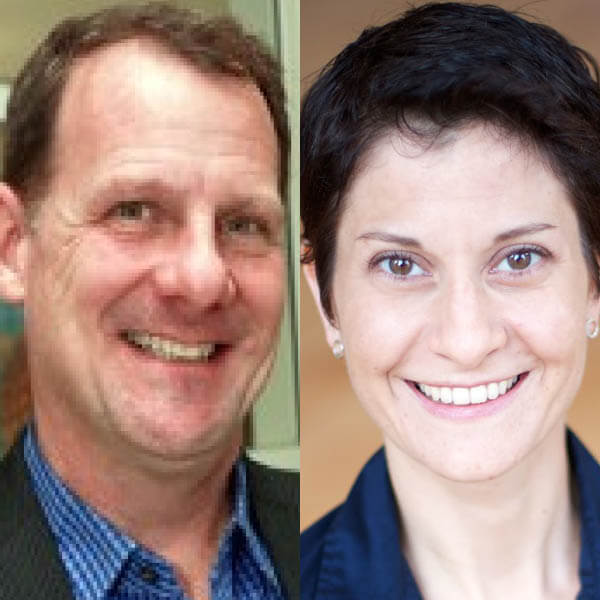
QUESTIONS
You have gained significant familiarity with many core issues surrounding the performing arts (dance/music in particular), and are aware of many of the challenges facing young and emerging performing artists.
- If you had to pick just one or two, what do you sense are the most significant changes related to classical music / dance audiences that will continue to impact the job prospects for conservatory students in the years ahead?
- If you had to pinpoint just one or two things, what do you think our conservatories and performing arts schools should do differently to better prepare our students for general success in the performing arts marketplace
- ADVICE FOR OUR STUDENTS: If there was one piece of advice you could give a young musician/dancer aspiring to a career as a performer, what would it be?
- ADVICE FOR US: You have an opportunity right now to talk to music, theatre, and dance faculty seeking to boldly reimagine undergraduate degree programs, not only with an eye strengthening general program integrity where appropriate (including fiscal integrity) but to also strengthen the ability of those programs to support student preparation for successful 21st century careers in the performing arts. Is there anything you’d especially like to share with them as they tackle that challenge?
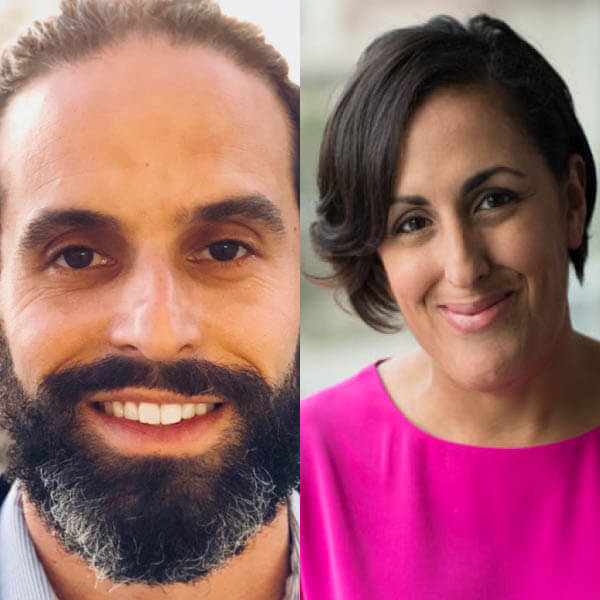
OCTOBER 29
Thought Leaders among Performing Arts Presenters
Justin Kantor
Co-founder & Director of Operations, (Le) Poisson Rouge
Co-founder, Director of Operations at (Le) Poisson Rouge, one of the country’s most innovative, intimate and genre-busting performance venues.
Kendra Whitlock Ingram
Executive Director, The Robert & Judi Newman Center for the Performing Arts
Executive Director, The Robert & Judi Newman Center for the Performing Arts, University of Denver. Previously, she held senior management positions at Omaha Performing Arts (overseeing all performing arts programming), Shenandoah Conservatory, Baltimore Symphony, and Detroit Symphony.
QUESTIONS
You have gained significant familiarity with many core issues surrounding the performing arts marketplace, audience preferences/tastes, and the types of skills that young artists bring with them from intensive conservatory training.
- If you had to pick just one or two, what do you sense are the most significant changes related to audiences or the general entertainment marketplace that will continue to impact the job prospects for conservatory performing arts students (music/dance/theatre) in the years ahead?
- If you had to pinpoint just one or two things, what do you think our conservatories and performing arts schools should do differently to better prepare our students for general success in the performing arts marketplace?
- ADVICE FOR OUR STUDENTS: If there was one piece of advice you could give a young performing artist aspiring to a career as a performer, what would it be?
- ADVICE FOR US: You have an opportunity right now to talk to music, theatre, and dance faculty seeking to boldly reimagine undergraduate degree programs, not only with an eye strengthening general program integrity where appropriate (including fiscal integrity) but to also strengthen the ability of those programs to support student preparation for successful 21st century careers in the performing arts. Is there anything you’d especially like to share with them as they tackle that challenge?
NOVEMBER 19
Thought Leaders in Music/Theatre/Conservatory Education
Helena Gaunt
Principal, Royal Welsh College of Music & Drama
Principal of Royal Welsh College of Music & Drama. Formerly the Vice Principal and Director of Innovation at Guildhall School of Music & Drama. Has led the international Innovative Conservatoire conference focusing on innovations/changes in the USA and Europe for many years.
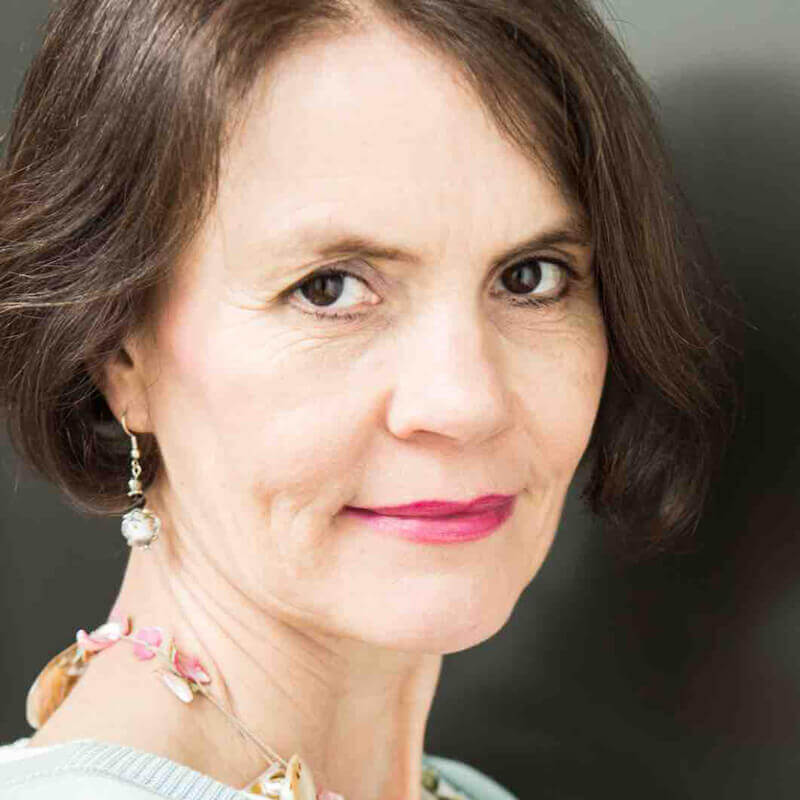
QUESTIONS
You have gained significant familiarity with many core issues surrounding performing arts training within the higher education field, including innovative work being done internationally in conservatory settings in response to changes in audience preferences/tastes and a fast-changing marketplace.
- If you had to pick just one or two, what do you sense are the most significant changes related to either Music/Theatre/Dance audiences or the general entertainment marketplace that will continue to impact the job prospects for our Conservatory music/theatre/dance students in the years ahead?
- If you had to pinpoint just one or two things, what do you think our conservatories and performing arts schools should do differently to better prepare our students for general success in the performing arts marketplace?
- ADVICE FOR OUR STUDENTS: If there was one piece of advice you could give a young musician, actor, or dancer aspiring to a career as a performer, what would it be?
- ADVICE FOR US: You have an opportunity right now to talk to music, theatre, and dance faculty seeking to boldly reimagine undergraduate degree programs, not only with an eye strengthening general program integrity where appropriate (including fiscal integrity) but to also strengthen the ability of those programs to support student preparation for successful 21st century careers in the arts. Is there anything you’d especially like to share with them as they tackle that challenge?